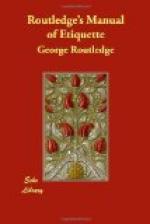We will take it for granted, then, that a gentleman has in one way or another become fascinated by a fair lady—possibly a recent acquaintance—whom he is most anxious to know more particularly. His heart already feels “the inly touch of love,” and his most ardent wish is to have that love returned.
At this point we venture to give him a word of serious advice. We urge him, before he ventures to take any step towards the pursuit of this object, to consider well his position and prospects in life, and reflect whether they are such as to justify him in deliberately seeking to win the young lady’s affections, with the view of making her his wife at no distant period. Should he after such a review of his affairs feel satisfied that he can proceed honourably, he may then use fair opportunities to ascertain the estimation in which the young lady, as well as her family, is held by friends. It is perhaps needless to add, that all possible delicacy and caution must be observed in making such inquiries, so as to avoid compromising the lady herself in the slightest degree. When he has satisfied himself on this head, and found no insurmountable impediment in his way, his next endeavour will be, through the mediation of a common friend, to procure an introduction to the lady’s family. Those who undertake such an office incur no slight responsibility, and are, of course, expected to be scrupulously careful in performing it, and to communicate all they happen to know affecting the character and circumstances of the individual they introduce.
We will now reverse the picture, and see how matters stand on the fair one’s side.
First let us hope that the inclination is mutual; at all events, that the lady views her admirer with preference, that she deems him not unworthy of her favourable regard, and that his attentions are agreeable to her. It is true her heart may not yet be won: she has to be wooed; and what fair daughter of Eve has not hailed with rapture that brightest day in the springtide of her life? She has probably first met the gentleman at a ball, or other festive occasion, where the excitement of the scene has reflected on every object around a roseate tint. We are to suppose, of course, that in looks, manner, and address, her incipient admirer is not below her ideal standard in gentlemanly attributes. His respectful approaches to her—in soliciting her hand as a partner in the dance, &c.—have first awakened on her part a slight feeling of interest towards him. This mutual feeling of interest, once established, soon “grows by what it feeds on.” The exaltation of the whole scene favours its development, and it can hardly be wondered at if both parties leave judgment “out in the cold” while enjoying each other’s society, and possibly already pleasantly occupied in building “castles in the air.” Whatever may eventually come of it, the fair one is conscious for the nonce of being unusually happy. This emotion is not likely to be diminished when she




